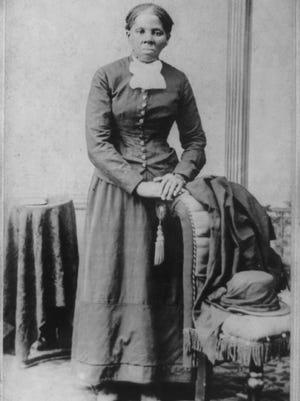Tubman $20 may be priceless for Eastern Shore

The Harriet Tubman $20 bill is a landmark with a watermark for women, African Americans ... and the Eastern Shore of Maryland?
The famed conductor of the Underground Railroad was born near Bucktown in Dorchester County, circa 1820.
Several sites around the county pay tribute to Tubman, including a museum in Cambridge and a scenic byway. A nearly 12,000-acre national park dedicated to telling her life story is set to open in spring 2017.
When Treasury Secretary Jack Lew announced Wednesday that Tubman will be replacing Andrew Jackson on the $20, it put the former slave and abolitionist on a path toward becoming the first African American to grace U.S. currency and the first woman on paper money in about a century.
It's not every day, of course, that an Eastern Shore native receives such an honor. And Dorchester is first in line to cash in.
“We expect a tsunami probably when the first bills are published in a few years," said Ceres Bainbridge, who has worked for more than a decade for the county's tourism office to raise Tubman's profile locally. "That’s when people say, 'Oh yeah, let’s see that place.”
The design of the new bill is expected to be completed by 2020, but Lew didn't specify when the bills would start showing up in people's wallets.
Tubman was initially a candidate for the $10, but a groundswell of public sentiment to retain Alexander Hamilton on that bill led her to the $20 instead.
That was just fine with Royce Sampson, tour director with the Harriet Tubman Museum in downtown Cambridge.
“There’s something about the $20 bill that carries some weight. If you’ve got a 20, you feel like you’ve got some money," he said.
Lew's decision marks a "long overdue" acknowledgement of the role of women and African Americans in U.S. history, Sampson said.
Harriet Tubman: Slavery to humanitarian to legend
Since the announcement, the decade-old museum has been getting more phone calls and visitors. The newly designed $20, Sampson predicted, "will really give more meaning for the story we’ve been trying to tell.”
Tubman was among 15 American women considered for the $20, a group that included icons such as Rosa Parks and Eleanor Roosevelt. In the end, Tubman received the most votes out of the 600,000 collected by the group “Women on $20s."
There's no way Dorchester could have mounted such support on its own, Bainbridge said. The outcome demonstrates how widely embraced and beloved Tubman is more than a century after her death, she added.
The new bill should be arriving at just the right moment for Dorchester, Bainbridge said. If it had been announced a decade or more ago, the county wouldn't have been ready. But with the museum, the byway and the new national monument, it now has resources available to visitors piqued by the currency change, she said.
Susan Meredith and her family run the Bucktown Village Store, an 18th century country store that figures largely in Tubman's biography. It's the place where she was struck in the head while trying to help a fellow slave — her first public act of defiance.
Meredith has some thoughts on the design: “I just hope they make her beautiful like she was.”
No pictures exist of Tubman during her younger days. Meredith bases her belief on a 19th century newspaper ad offering a reward for her capture that describes her as "fine-looking." Her son discovered the ad in a pile of old newspapers that had been thrown out.
She already is seeing a tourism boost from the news. On Wednesday, the day the $20 change was announced, Meredith saw a group of women standing outside the store and let them inside for an impromptu tour.
“They were just elated they were there the moment it was announced in the news," Meredith said.
Contact reporter Jeremy Cox at 410-845-4630 or on Twitter @Jeremy_Cox.